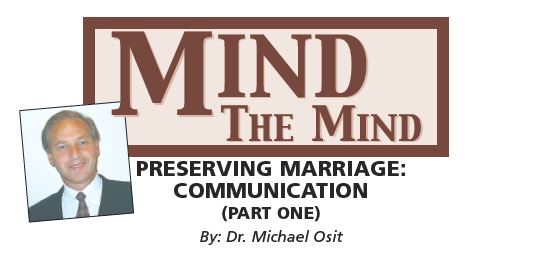Are you getting married or are recently married? Have you been married for years and want to decrease the probability of getting divorced? The divorce rate in the United States remains at 50%, and is even higher for second marriages. If you are engaged and want to try to prevent
divorce, research indicates that there are lower divorce rates among couples who discussed three specific subjects prior to marriage: financial philosophy and planning; children (if you want them, how many, and parenting styles); and religious affiliation.
The top four reasons existing marriages most commonly end are 1) communication difficulties, 2) financial stresses, 3) parenting conflicts, and 4) boredom.
Beginning with communication, this is the first part of a four-part series addressing these common marital issues. The subsequent installments will address dealing with financial stresses, parenting conflicts, and boredom. Communication For couples, communication is the “glue” of the relationship. It forms, maintains, and feeds the relationship enabling that special feeling of connection that is different from all your other relationships. Couples generally fall into one of three problematic communication categories. They are either sparse communicators, poor communicators, or a combination of both. Sparse communicators hardly talk at all about their feelings and the relationship. They may talk a lot about tasks and the necessary information needed to run their lives, but that won’t enhance the emotional connection that a loving relationship needs.
Poor communicators are often very good at expressing their feelings, usually anger, but conflict resolution is hampered by inappropriate expression of those feelings and an overuse of defense mechanisms to deal with conflicts. Couples who experience both tend to vacillate
between a lack of communication and ineffective communication. Many couples I work with recall that when they were dating, they would talk for hours about everything from their jobs to how they feel about each other. Then, life and the complexities of normal stresses and
children make those 3-hour telephone calls impractical, and the relationship begins to go stale. Sometimes, couples need to learn or revisit some fundamental skills to be able to communicate in a way that facilitates a loving, caring relationship.
These skills are also helpful in day to day conflict resolution so that hostile feelings don’t pervade your relationship.
The following do’s and don’ts are some simple suggestions to improve your communication.
Don’ts
• Don’t use sarcasm as it has an underlying edge of anger.
• Don’t use an elevated tone of voice when responding to a conflict. Your partner will only respond to your anger, not your words.
• Don’t only respond to your partner’s verbal statement. Look beyond it or you will miss the real issue.
• Don’t be defensive or have excuses for your actions. This will only intensify your partner’s anger and upset feelings.
Do’s
• Do use a skill called reflective listening with your partner. Reflective listening identifies the feeling that drives the words. Using reflective listening as a response to, “Why are you late?” would be, “You sound angry. I know it’s a long day with the kids. Let me take over.” Reflecting the feeling and identifying the real issue will be far more effective than responding to the “late” issue. Real issues are often hidden
in communication and not expressed directly.
• Do attend to the nonverbal message as much as the expressed words. Tone of voice, volume, facial expression, and body language tell the
real story and will facilitate effective communication.
• Do take ownership for your mistakes.
• Do regularly discuss your relationship and share your feelings and thoughts about your life together so that you remain on the same page through the course of your relationship.
Communication is complex and occurs on many levels. Since many messages are hidden or disguised, you will need to attend to the “do’s” and try to avoid the “don’ts.” Effective communication maintains and massages your relationship in the most positive ways.
Dr. Michael Osit is a Licensed Psychologist practicing in Warren, and author of Generation Text:Raising Well Adjusted Kids In An Age Of Instant Everything (07/08) and The Train Keeps Leaving Without Me: A Practical Guide to Freedom, Self-Fulfillment, and Happiness (09/16)
